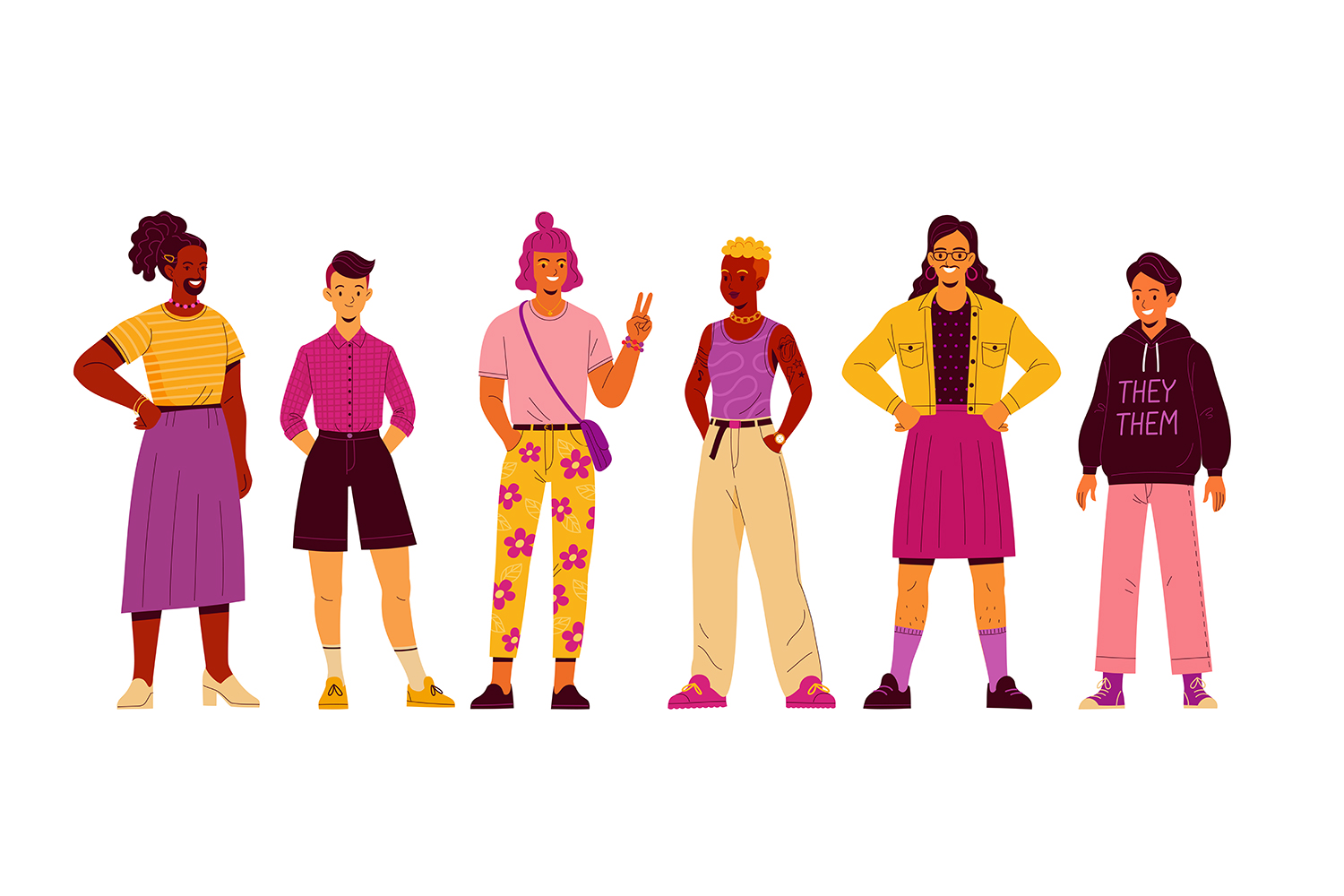Table of contents
We’re hearing this word more and more in the media and on social media, but what does “non-binary” mean?
Non-binary is a gender identity that falls outside of the traditional binary conception of male/female gender. Non-binary people can feel both masculine and feminine, neither, or something completely different. This can include identities such as genderqueer, androgynous, agender, bigenre, pangender, etc.
Non-binary people may choose to present their gender in different ways, such as using gender-neutral pronouns such as “iel”, “ille”, “iels”, “ol”, “ul”, “al”, or “ellui”, wearing clothing that is not typically associated with a particular gender, altering their bodies through surgery or hormones, or not altering their appearance at all, each case is different.
It is important to note that non-binary is a valid and real gender identity, and that non-binary people have the right to be respected and treated with dignity, just like any other person.

Illustration : (c) Shutterstock
What does identifying as a non-binary person change?
Being non-binary can change a lot of things for a person on a daily basis and in their life in general, as it means that they do not conform to the binary gender norms that have been imposed by society. This can affect their personal, professional, social, and medical lives in many different ways.
Here are some examples of the changes that being non-binary can bring:
- Personal identity: Being non-binary can help a person understand and define themselves outside of the gender binary norm. This can help build self-confidence and self-esteem, as well as the ability to live life on one’s own terms.
- Pronouns: Non-binary people may use pronouns different from those associated with binary genders, such as “iel,” “ille,” “iels,” “ol,” “ul,” “al,” or “ellui.” Asking others to respect these pronouns can be an important change for the non-binary person, as it implies that their gender identity is recognized and respected.
- Appearance: non-binary people may choose to alter their appearance in different ways to better match their gender identity, such as wearing clothing that is not associated with a particular gender, or changing their physical appearance through surgery or hormones.
- Relationships: Being non-binary can also impact relationships with others, including friends, family and romantic partners. This may require clearly communicating one’s understanding of one’s gender, as well as setting clear boundaries and expectations.
- At work: Being non-binary can also impact the work environment of a person who identifies as “non-binary,” as it may involve asking to be treated equally and respectfully in the workplace, or seeking a more inclusive work environment.
How do you behave with a non-binary person?
How to behave with a non-binary person depends primarily on the individual in question, as each person is different and may have different preferences in language, pronouns, appearance, and behavior. However, here are some general tips for interacting with a non-binary person in a respectful and inclusive manner:
- Respect the gender identity of the non-binary person. If the person has informed you of their non-binarity, use pronouns and language that the person prefers, even if it differs from binary gender norms. If you are unsure of the appropriate pronouns or language to use, it is always best to ask the person how they prefer to be treated.
- Avoid making assumptions about how the non-binary person should present themselves to you. Do not assume that all non-binary people look the same or prefer the same types of clothing.
- Avoid inappropriate comments or questions about the non-binary person’s body or genitals. A person’s body does not determine their gender and it is important to respect each person’s privacy.
- Be considerate and respectful of the non-binary person in all social situations. Avoid making comments or jokes that may be offensive or degrading to non-binary people.
- Listen and learn. If you don’t understand something about the non-binary person, ask them to explain it to you. Listen to their explanation and respect their experience and you’ll be fine!
How do you know if you are non-binary?
Good question ! Knowing if you are non-binary is a personal and complex question that can take time to investigate. There is no “test” or checklist to determine if you are non-binary or not. However, here are some questions that may help you begin to explore your gender identity:
- How do you feel about binary gender norms? Do you feel comfortable with the stereotypical male or female gender roles and behaviors that society imposes on us?
- How do you feel when others categorize you according to binary gender norms? Do you feel comfortable being identified as male or female, or do you prefer a more neutral term like “I am a person”?
- How do you feel about the pronouns you use? Are you comfortable with the pronouns “he” or “she” or do you prefer non-binary pronouns like “he” or “she”?
- How do you feel about your body? Do you feel comfortable in your current body or would you like to have a different body to better match your gender identity?
- How do you feel about your self-expression? Do you feel comfortable dressing masculine, feminine, or do you prefer a more androgynous or neutral expression?
It is very important to remember that gender identity is unique to each person, and there is no right or wrong way to be non-binary. If you have questions about your gender identity.
